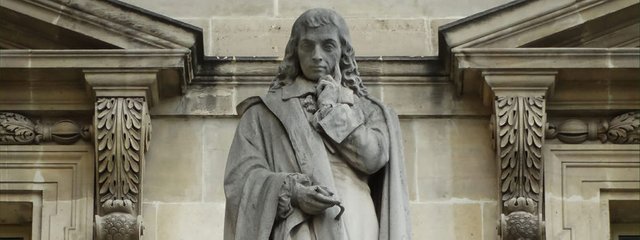Either Christianity is true or it's false. If you bet that it's true, and you believe in God and submit to Him, then if it IS true, you've gained God, heaven, and everything else. If it's false, you've lost nothing, but you've had a good life marked by peace and the illusion that ultimately, everything makes sense. If you bet that Christianity is not true, and it's false, you've lost nothing. But if you bet that it's false, and it turns out to be true, you've lost everything and you get to spend eternity in hell.
-Blaise Pascal

Blaise Pascal was born on 19 June 1623 in Clermont-Ferrand, Puey de Home, France, to the family of Etienne Pascal, an amateur mathematician and a highly-eminent jurist, advisor to the royal court. It is in his family, where he has been brought up in the spirit of Michel de Montten's pedagogical ideas, that Pascal receives his initial knowledge of mathematics and philosophy, and advances in these sciences so quickly that he earns the reputation of a miraculous child. In fact, the father who took up his son's education abstained from more serious math studies until his 15th birthday, believing that earlier studies of such a complex science prevented the education. A year later, however, Pascal issued the famous Essai pour les coniques, which later developed his later Pascal's Theorem. As a teenager, he has developed many classics for mathematics and physics ideas. A 17-year-old man invented an original computer, which he later developed, and which was named King's Pascal in 1649 under the name "Pascal's Wheel". 1646 is a breakthrough for the Pascal worldview. This year, his father is heavily ill and two monks scientists, followers of the reformist ideas, who preaches the ideas of Cornelius Jansen, Divine grace can save man as long as he can reach it. Not long after, Pascal embraced the ideas of Jansenism and became their zealous follower and preacher. Under his influence, his sister Jacqueline, a very popular beauty in the secular circles of Paris, had a monastic vow. Blaise Pascal himself decides on such a step a little later, and in the meantime continues his extensive math and physics activities. On the night of November 23, 1654, "about ten and a half in the evening," Pascal experienced a spiritual twist. In a mystical contact with God, he withdraws from worldly affairs and devotes himself to Jesus Christ. In his own experience he recorded a piece of parchment that stitches into the hem of his garment and brings with him a lifetime. It was found after his death. This text, known as "Pastel Amulet" or "Memento", Pascal himself calls "Feu" - "fire." Gradually, Pascal became more and more close to the Jansenist circle, and the society associated with the "Port-Royall" participated with a firm stance in the religious disputes of that time. He spent his last years in this cloister. Seriously ill - migraine, chronically ill teeth, kidney failure, and at the end of his life, he devotes himself entirely to Christianity and writes the famous "Thoughts" (notes that lead to the creation of the unpublished future work "Apology of Christianity"). He died on 19 August 1662 in Paris at the age of 39. He is buried in the church of Saint Etienne du Monde in Paris.


Excellent post!
Downvoting a post can decrease pending rewards and make it less visible. Common reasons:
Submit
thanks :)
Downvoting a post can decrease pending rewards and make it less visible. Common reasons:
Submit
Excellent. YOU put me to review Pascal's biography. Thank you everything you write, I am very passionate
Downvoting a post can decrease pending rewards and make it less visible. Common reasons:
Submit
Pascal's Wager still being used today.
Downvoting a post can decrease pending rewards and make it less visible. Common reasons:
Submit